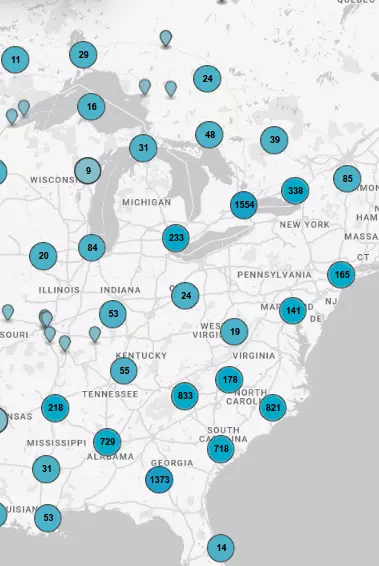John W. Pagliano
Daniel H. Clevenger
Bowen’s Bench
Site of the First Protestant Church in California
The Founding of Baton Rouge
The name Baton Rouge comes from the Indian word "Istrouma," meaning Red Stick.Earliest written records about Baton Rouge were provided by members of Iberville's expedition on March 17,...
- louisiana
- baton rouge
Site of the Weiss House
On September 8, 1935, Dr. Carl Austin Weiss was living here with his family in a small frame cottage. About 9:30 that evening, U.S.Senator Huey P. Long was shot in the corridor just off the house...
- louisiana
Site of Spanish Battery 1779
Behind an orchard on a mound near this site artillerymen under Spanish Governor Bernardo Galvez placed a battery of six cannon and on September 21, 1779, after a three-hour bombardment, forced the...
- louisiana
- revolutionary war
Lafayette Building
One of the earliest remaining architecturally significant buildings in the city. Originally the residence of Judge Charles Tessier, first Probate Judge of East Baton Rouge Parish, who acquired...
- louisiana
- baton rouge
Blue Star Memorial Highway, Benicia
Ealey Brothers
The Ealey family of Sibley has produced some of the most talented musicians to emerge from the Natchez area. Brothers Theodis, YZ, and Melwyn Ealey performed together locally in the band YZ Ealey...
- mississippi blues
Natchez City Cemetery
Established in 1822 on a ten acre tract, this cemetery grew into a park notable for its variety of 19th century iron and marble work. People of all walks of life are buried within the cemetery.
- mississippi cemetery
Coleman's Crossroads
On July 4, 1864, a small brigade of Confederate cavalry under the command of Col. Robert C. Wood attacked a Union force composed of the Mississippi Marine Brigade and two regiments of United...
- mississippi
- civil war
Belles Lettres Building
Ca. 1851. Neoclassic Revival. The origin of this structure is uncertain. It is generally assumed to be one of two buildings completed in 1851 for use by a campus literary society. Its architecture...
- mississippi
- education
Old Port Gibson to Rodney Road
This road is the first established route from Port Gibson and Alcorn to Rodney, and was constructed in the early nineteenth century. Composed of loess soil, the old roadbed and roadside bluffs for...
- mississippi
Billy Cannon - 1959 Heisman Memorial Trophy Winner
Dr. Billy Cannon is among the most heralded and identifiable college football players in NCAA history and is largely responsible for the emergence of big-time football at LSU. Cannon, who was born...
- louisiana
- sports
- football
Bourgeois Famille
Dedicated to the memory of our courageous Acadian ancestors who settled this area in the mid 1700's. Once buried here, most of their original graves have been lost to time and the river.Erected...
- louisiana
Camp Moore
One of the principal Louisiana Confederate induction centers and training camps during the war for southern independence. Named for Governor Thomas Overton Moore. Over 400 soldiers buried in the...
- louisiana
- civil war
Antonia Plantation
A typical raised Creole Cottage, Antonia was an early 1800's working sugar plantation. Established through a 1793 Spanish Land Grant claimed by Pierre Lebert. Zephirin Blanchard married...
- louisiana
- plantation
The Old Saint Gabriel Church
In 1699 Pierre Lemoyne, Sieur D'Iberville, father of Louisiana, explored the Mississippi and its distributary the Ascantia, later called Bayou Manchac. By 1758 exiled Acadians had settled...
- louisiana
- church
Battle of Baton Rouge, 1862
On August 3, 1862, Confederate troops from Alabama, Kentucky, Tennessee, Mississippi, and Louisiana under General John C. Breckinridge attacked from the east in an unsuccessful attempt to dislodge...
- louisiana
- civil war
